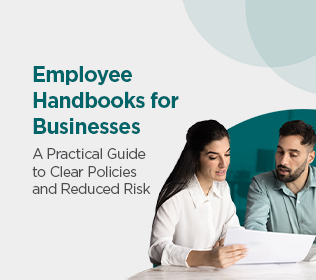
Discussions about politics at work can be divisive and may quickly cause disagreements and tension. There are practical and legal reasons why political discussions cannot be banned entirely from the workplace. Further, employers have legal responsibilities during an election year, with many states requiring employers to notify employees about voting leave rights. Therefore, employers should proactively plan for discussions about politics in the workplace to prevent issues from occurring.
Office Compliance Policies: Election Laws and Voting Leave
In addition to navigating difficult political discussions in the office, the first step employers should take is to establish their legal obligations regarding elections. Many states require employers to give their team members time off to vote, especially when an employee’s work schedule does not allow ample voting time during poll hours. No federal law requires employers to offer time off to vote, but most states have this requirement, so employers should reference laws in their state.
For example, in New York, employers must give their employees up to two hours of paid time off if they do not have “sufficient time to vote.” According to the New York State Board of Elections, “if an employee [does not have] four consecutive hours to vote either from the opening of the polls to the beginning of their work shift or four consecutive hours between the end of a working shift and the closing of the polls,” then the employee is eligible for paid time off to vote. This four-hour window is how New York determines “sufficient” time to vote. The NYS Board of Elections goes on further to provide an example. “If an employee is scheduled from 9 am to 5 pm, and the polls are open from 6 am to 9 pm, the employee is not eligible for paid time off to vote because the polls are open four consecutive hours after the employee’s shift ends at 5 pm. However, if an employee is scheduled to work from 9 am to 6 pm, then the employee is eligible for paid time off to vote because they only have three consecutive hours off at the beginning and end of their shift.” If there are remote employees, managers must consider the employee’s home state and the state where the business is located.
Suppose a business is located close to a state border, and an employee lives in one state but commutes to another. In that case, employers are “encouraged to follow the state law most beneficial to the employee.” Complying with applicable voting leave laws is crucial to avoid any legal repercussions, and by erring on the side of the more generous policy, employers can prevent issues.
Promoting Civic Engagement Responsibly
Employers are also encouraged to promote civic engagement during election season. The right to vote is an opportunity to make your voice heard, and employers can positively promote this in the workplace. A neutral way to promote civic engagement is to encourage voter registration. This way, employers encourage voting without taking any political stance. Employers can also empower workers to educate themselves on local elections with nonpartisan informational resources. Vote411.org offers online voter registration, voting info, polling locations, candidate information, and ballot issues. If voting leave is required in your state, inform employees of their rights to voting time off and any applicable restrictions. These resources are helpful for employees and inspire them to take advantage of their right to vote.
Understanding Free Speech in the Workplace
One of our most treasured rights as Americans is the right to free speech, which the First Amendment guarantees. However, restrictions apply to this right, and the workplace is one of them. While government employees may have a right to free speech in the workplace, this is not the case for private employees. Before employers begin to think they can set workplace policies banning any undesirable speech in the office, there are certain situations in which employers cannot interfere.
Employees have protections under the National Labor Relations Act (NLRA). The NLRA protects workers’ rights to “engage in concerted activity,” meaning that workers can engage in collective bargaining for mutual aid, which applies in private workplaces regardless of whether they have a union. For this reason, employers must be careful about managing political conversations in the workplace lest they violate workers’ rights under the NLRA.
Examples of Protected Speech Under the NLRA
If a political conversation arises because workers are discussing minimum wage, for example, this should not be discouraged as it may fall under NLRA protections.
If an employee is discussing how a presidential candidate may potentially affect workplace conditions, this is also acceptable speech.
These are just two examples of situations in which a political conversation is within an employee’s rights under the NLRA. Of course, politics at work cannot be allowed to become disruptive. Employers must balance their workers’ political speech rights while maintaining a productive and respectful work environment. In the next paragraph, learn practical methods for preventing tension when politics come up in the office.

Preventing Political Tension and Maintaining a Neutral Environment
With a better understanding of the employer’s responsibilities regarding politics in the workplace, how should business owners prevent tension and promote a neutral environment? First, employers should set clear guidelines for political discussions in the office. While these guidelines cannot ban employees from discussing politics, employers should set policies that encourage respect and an unbiased culture. For example, if an employer has concerns about employees wearing political merchandise, such as buttons, t-shirts, and hats affiliated with a particular political party or candidate, it is recommended to set a dress code that prevents all such political statements. This prevents a workplace from inadvertently favoring one side over another. This kind of policy can be included in a code of conduct within an employee handbook. When making a dress code policy, it’s important to work with your legal counsel to ensure that any changes are legally compliant. In fact, it is recommended to review your employee handbooks on a yearly basis, as state and federal laws update frequently and may affect your handbook policies. For further information about employee handbooks, review a webinar here, and an example code of conduct policy can be found here.
Workers may have concerns over the consequences of sharing their political opinions with managers, fearing they could damage their promotion prospects. In their roles as managers, it’s important to keep conversations neutral and non-partisan. Managers should not express divisive opinions that could alienate their team members.
Managers can work proactively by advocating for calm and rational conversations when things appear tense. If there is a TV in the break room, consider setting the channel to local, nonpolitical news. A major news network may cause heated discussions between colleagues.
Employees should not feel pressured to share their political affiliations if they don’t want to. In addition to protecting an employee’s right to express their opinions, workers also have the right to withhold that information. A code of conduct helps employers set expectations, providing a reference if needed.

Implementing Communication Strategies for Discussing Politics at Work
Offering effective communication strategies for a neutral workplace is desirable for employees. According to a recent study on 2024 Sociopolitics in the US Workplace, 58% of polled workers feel that respectful sociopolitical discourse should be encouraged in the office, with 74% stating that these discussions should occur in a safe space that includes voicing opposing opinions respectfully. The study further reports that 58% of workers believe that respectful political discourse should be encouraged as a part of an inclusive and diverse company culture.
Employers should train managers to identify and address heated discussions to support this. Employees may have the right to have political discussions, but they cannot be allowed to become aggressive or hostile. Managers should step in to calm the situation if a conversation becomes disruptive. Ideally, managers should step in before a conversation has a chance to become a political argument. Managers are mediators, and these skills are useful in work conversations as well as between two employees who disagree on politics. Conflict mediation is a great skill for managers to have for any situation, not only politics at work. There are many options for conflict resolution training, including easy-to-administer online courses. PrestigePEO works with TrainingToday, which has a library of helpful courses on HR compliance, professional skills, management, anti-harassment, and more.
Overall, employers should focus on encouraging healthy and respectful conversations instead of banning politics at work, which is a legal quagmire. HRMorning provides a list of tips that managers can offer employees. Fisher Phillips also provides a useful checklist of Employment Practices to review, as well as an article on how to handle employees who express divisive political opinions publicly. A positive communication strategy is beneficial not only for political conversations but for all workplace conversations. Setting these policies benefits employers looking to maintain a cooperative work culture. Politics at work can be difficult, but with help from managers, these conversations can take place in a safe and inclusive manner.
Addressing Employee Concerns and Anxiety
During election season, and any time our country goes through stressful events, employees may feel anxiety about the state of our nation. As an employer, recognize and validate these concerns about the impact elections can have on employees’ personal lives. This can be done without taking a partisan stance on politics. SHRM offers four tips for navigating political discussions at work, which include encouraging a respectful culture, acknowledging the tensions that elections bring, and having open-minded conversations. Ensure your workplace maintains psychological safety among colleagues, an essential part of a healthy company culture. Recognizing the stress of election season helps employees feel their concerns are heard.
Fostering a Positive Workplace Culture During an Election Year
Even outside of an election year, employers should prepare for politics to enter the workplace. In addition to legal responsibilities, it is vital to plan how to handle these conversations in advance. Employers should not attempt to ban political conversation and instead encourage a respectful and inclusive workplace environment.
For small and mid-sized business owners, the help of a PEO is key during election season. Employers can rely on PrestigePEO for guidance from HR experts, HR support for any interpersonal issues, compliance advice for employee handbook and code of conduct creation, and so much more. Small and mid-sized business owners do not need to tackle the stresses of election season alone. Contact us today to learn how you can get started with PrestigePEO.




